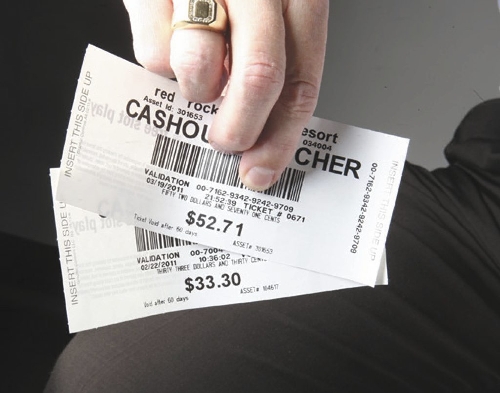Uncashed payout tickets could bring millions to the state

CARSON CITY — Some people who win a dollar or two off cashless slot machines don’t even bother cashing in their tickets.
Others realize they’ve lost their payout tickets when they get home or to their hotel room, and figure their winnings wouldn’t even cover the cost of gasoline to drive back to the casino.
They just don’t fret about it.
But they probably would be surprised to hear that all those small amounts of unredeemed winnings add up.
To as much as $50 million a year, according to one estimate.
Up to this point, the casinos have just kept the money, figuring it belongs to them.
But that would change if Assemblyman William Horne has his way.
On Tuesday, the Las Vegas Democrat said he doesn’t think it is right for the casinos to reap the revenue off uncashed tickets. He urged the Assembly Judiciary Committee, which he chairs, to pass his bill that would declare uncashed gaming tickets are unclaimed property whose value should be given to the state.
Assembly Bill 219 would allow the state every three months to take the value of the unredeemed gaming tickets. It would not apply to sports wagering. No vote was taken on the bill.
Gov. Brian Sandoval said in an interview Tuesday that he was aware of Horne’s bill but has not taken a position whether to support it.
“It is premature to comment on it,” he said. “There may be several changes before it reaches my desk.”
But if he sees it as a tax or fee increase, the bill will be in trouble. He has pledged not to approve any tax increases this session.
THE ARGUMENTS
And then there’s the gaming industry, the state’s biggest tax revenue engine and arguably the biggest influence in the Legislature. Its lobbyist raised strong objections to the bill Tuesday.
Nevada Resort Association lobbyist Pete Ernaut argued the bill “penalizes the gaming industry for innovation.” He said casinos put in the coinless slot machines for the convenience of customers.
Assemblywoman Olivia Diaz, D-North Las Vegas, challenged his view.
“When they took away the coin-operated machines, I don’t think it was done for convenience. I know a lot of people in the gaming industry. A lot of jobs were lost.”
Horne agreed, saying, “It was a business decision. They saved money (on labor costs) by putting in the (cashless) machines.”
Ernaut argued that in some casinos the patron has a choice of playing coin-operated or cashless machines and the ticket represents a legal contract between the player and the casino. He also argued that the bill as written would not bring the state any more money in the next two years.
But Assemblyman Tick Segerblom said the Legislature could force casinos starting this July 1 to turn over to the state the value of unredeemed tickets.
“You are the Legislature,” Ernaut said .
Other Democratic legislators did not seem to buy gaming’s arguments.
Segerblom , D-Las Vegas, even suggested the committee should amend Horne’s bill and make it retroactive, a step that could lead to the state raking in even more money.
Assemblyman James Ohrenschall, D-Las Vegas, said he sees no difference between unredeemed gaming tickets and unclaimed gift cards. Stores and credit card companies are required to forward these funds to the state treasurer as unclaimed property under a 2007 law.
ADDING UP THE TICKETS
The unredeemed gaming tickets totaled about $11 million at 20 percent of Nevada casinos last year, according to an audit by the Gaming Control Board.
Nevada Resort Association President Virginia Valentine said she is not aware of the total amount of undeemed gaming tickets held by casinos. The Gaming Control Board estimate based on just one-fifth of the casinos is the only known figure.
Under those figures, the total held by the entire industry could be more than $50 million.
Horne came up with the idea for the bill after a constituent complained he was not permitted to cash out an old gaming ticket he received from a cashless slot machine.
Most gaming tickets must be cashed out within 60 days, or the money reverts to the casino, according to the Gaming Control Board Chairman Mark Lipparelli. Casinos pay gaming taxes on unredeemed tickets.
“There is no way of telling who you are,” Horne said. “The tickets are untraceable.”
In many, if not most cases, the winning tickets are only for $1 to $3, he said.
UNCLAIMED PROPERTY
Horne said the bill represents just “a simple case of unclaimed property.”
“In all other cases of unclaimed property when you cannot identify the claimant it escheats (goes) to the state,” he said.
Last year the state treasurer reverted a record $66 million in unclaimed property to the state general fund.
The treasurer already takes as unclaimed property old bank accounts, checks, cash, items in safety deposit boxes and other things of value when the owner cannot be found. Items often are sold at auction. Under the law, the treasurer must return the money to the owner if he or she ever comes forward.
In 28 percent to 35 percent of the cases, the owner eventually is found, said Steve George, chief of staff in the treasurer’s office.
State Treasurer Kate Marshall has not taken a position on Horne’s bill.
Contact Capital Bureau Chief Ed Vogel at evogel@reviewjournal.com or 775-687-3901.